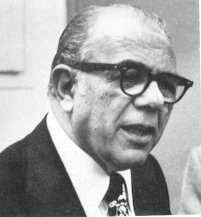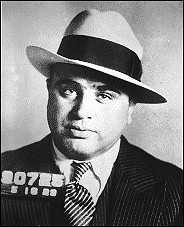Related Topics
Outlaws: Crime in Philadelphia
Even the criminals, the courts and the prisons of this town have a Philadelphia distinctiveness. The underworld has its own version of history.
Philadelphia Legal Scene
The American legal profession grew up in this town, creating institutions and traditions that set the style for everyone else. Boston, New York and Washington have lots of influential lawyers, but Philadelphia shapes the legal profession.
Investing, Philadelphia Style
Land ownership once was the only practical form of savings, until banking matured in the mid-19th century. Philadelphia took an early lead in what is now called investment and still defines a certain style of it.
Philadelphia Economics
economics
Philadelphia Changes the Nature of Money
Banking changed its fundamentals, on Third Street in Philadelphia, three different times.
Economics of La Cosa Nostra

|
| Angelo Bruno |
During all of the reign of Angelo Bruno, it was a common street opinion that The Organization tried to stay away from drugs, prostitution and shooting anybody except other mobsters. Some of that attitude is found in the scene of the movie The Godfather where a neophyte going to his first killing is instructed to "Watch out for those goddam innocent bystanders". It was okay to bribe the police, not okay to annoy them. Counterfeiting and kidnapping were big no-no's, even though counterfeiting was a core activity for the ancestral Mafia in Western Sicily during the Nineteenth century.

|
| Al Capone |
According to Robert Simone's book, the Philadelphia mob was mainly enriched by loan sharking. There are a lot of people who suddenly need cash desperately and can't get it quickly from banks. Simone himself was a compulsive gambler and frequently was in urgent need of money, either to throw it away or pay it back. Other people get caught in some illegal activity and suddenly need bail money to stay out of prison or up-front money for a lawyer. Or whatever. The Philadelphia mob had a reputation for being able to loan amounts of fifty or a hundred thousand dollars in response to a phone call, with home delivery of the money in fifteen minutes. For this, they would charge interest in the range of three percent a week, well above the usury limit, but probably not greatly out of proportion to the risk of loss. The police have little interest in transactions between willing parties, at least until the borrower fails to pay it back. Even at that point, it becomes a question of whether kneecaps will actually get broken, or baseball bats actually come in contact with skulls. Probably not very often, because the threat seems a credible one.
To run such a business requires large amounts of cash, hidden in safes or bricked up in walls. From this comes theft or attempted theft, with violent defense measures that often don't concern the police, much, unless those aforementioned bystanders get injured. Sometimes couriers get tempted to make unscheduled detours, but the police are fairly tolerant of informal restitution efforts. All in all, it's a nice clean illegal business.
An interesting sidelight is income tax evasion. It's entirely possible that The Organization would be willing to pay taxes if it could be done without filling out all those forms. Restaurants, bars, and market stalls can be run as a way to launder money and yet pay tax on it. But boys will be boys, and no doubt the IRS has, or had, some legitimate concerns. For years I felt the government was over-reaching when it jailed Al Capone for income tax evasion, after being unable, however, convinced it may have been, to convict him of overtly illegal activities. That's one side of it. But if you envision these organizations with millions of dollars in cash hidden away, it's easy to imagine them extending invisible credit to their associates for services rendered but not yet paid out and, of course, untaxed. Calling for such money on demand is not much different from having it in a bank. If appreciable amounts of that circumvention go on, the Internal Revenue Service really might have a grievance. Its image would be improved by demonstrating it is pursuing a named crime rather than a pretext to jail someone it doesn't like. Legislation could surely be devised which more carefully specified such illegalities. It might then be possible to bring an end to the appearance of putting people in jail for merely enjoying an ornate lifestyle. People who, almost by definition, cannot be proven to have committed a crime.
Originally published: Sunday, December 31, 2006; most-recently modified: Thursday, May 16, 2019